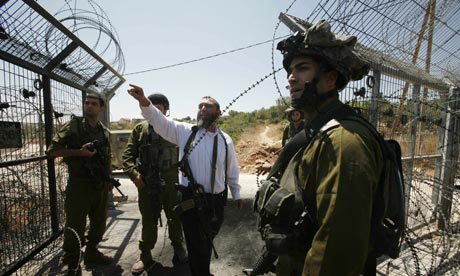
Drop the security excuse: Haaretz Editorial
The prime minister needs to make the difficult decision to secure Gilad Shalit’s release immediately and stop hiding behind security rationales to avoid that decision.
Prime Minister Benjamin Netanyahu’s explanations for the delay in a deal for the return of captive soldier Gilad Shalit are gradually being reduced to a single key argument: It is impossible to free heavyweight prisoners – people responsible for major terror attacks – because they will then endanger the welfare of all Israelis. In his speech last Thursday, Netanyahu explained that he is not willing to release such prisoners into the West Bank, because once there, they are liable to establish new terrorist networks that would threaten both Israel and the Palestinian Authority.
To refute this argument, it is sufficient to listen to what GOC Central Command Avi Mizrahi told Haaretz about six weeks ago: “The IDF can deal with this. … I’m not afraid of the return of these terrorists; it takes them a long time to reconnect to the territory.”
Mizrahi, who is responsible for the West Bank, can be relied on to know what he is talking about, even if his view contradicts that of Netanyahu.
But one need not rely on the view of any particular officer, because it is clear that the decision is not military, but political. The Israel Defense Forces’ ability to deal with 40 or 400 terrorists is not in question. Were it not for this ability, these prisoners would not currently be in jail.
The prime minister’s argument essentially equates the threat that these dozens of terrorists would pose if released with the far greater threats posed, for example, by Hezbollah or Iran. Yet Netanyahu has never been heard to say that Israel is incapable of dealing with these threats.
There is no choice but to conclude that the prime minister is trying to hide behind security rationales in order to avoid a difficult political and diplomatic decision. No one disputes that the price Hamas is demanding for the kidnapped soldier is a heavy one, but both in principle and in practice, Israel has already agreed to pay it. The proof of this is those 1,000 prisoners whom Netanyahu himself described as the agreed-upon price.
The prime minister would be wise not to put the public and its support for the Shalit family to the test. His weak arguments merely deepen the public’s distrust of his position.
He must make the difficult decision to secure Shalit’s release immediately. Four years of negotiation are a heavy price in and of themselves – both for Shalit and his family, and for a frustrated public.
US to press Binyamin Netanyahu to extend freeze on settlements: The Guardian
Barack Obama is anxious to build on what has been achieved since settlements freeze started in November
An armed Jewish settler in the occupied West Bank with Israeli soldiers during a demonstration in Beit Omar village near Hebron on Saturday. Photograph: Hazem Bader/AFP/Getty Images
Israel’s prime minister, Binyamin Netanyahu, will come under intense pressure on Tuesday to extend his 10-month freeze on the building of settlements in the West Bank when he meets President Barack Obama in Washington – amid warnings from the Israeli right that they will vigorously oppose such a move.

Despite the moratorium, building in settlements has continued in the past seven months thanks to loopholes and violations. Preparations are under way for a construction boom this autumn.
Obama is expected to press hard for a continuation of the ban in the knowledge that large-scale settlement expansion would imperil the fragile “proximity” talks between Israel and the Palestinians. White House aides last week made it clear that the president wants to “capitalise on the momentum” provided by the freeze.
Today, Netanyahu said the main goal of the White House meeting would be to move toward direct peace talks with the Palestinians. “Whoever wants peace must hold direct talks for peace. I hope this will be one of the results of the visit to Washington,” he said. But he has given little indication which concessions he is prepared to make and said in a TV interview on Friday that the government’s position on settlements had not changed.
The 10-month moratorium, which excludes building in East Jerusalem, is due to end at around the same time as the four-month period set for proximity talks comes to an end. Mahmoud Abbas, the Palestinian president, set a building freeze as a precondition for entering talks.
Israel’s combative foreign minister Avigdor Lieberman – a settler himself – has publicly urged Netanyahu to resist pressure to extend the freeze, saying concessions to Palestinians have not brought results. September would pose a “big test” for Israel, he said.
At least two other members of Netanyahu’s inner cabinet of seven have made their position clear. “We will renew building when the moratorium ends,” said Moshe Ya’alon. “There is no chance that Netanyahu will extend the freeze,” said Benny Begin.
Last week, leaders of the settlers warned that they would launch an “unprecedented struggle” if they were not permitted to resume building.
“If Netanyahu returns from the US with another commitment to a freeze, he will encounter an unprecedented response of settlers who will hound him no matter where he goes,” they said in a statement.
Settlers’ organisations have taken advertisements in the Israeli press, accusing the prime minister of “trampling on” the settlements. And Settlement Watch, an Israeli organisation, said that preparations are being made for a massive construction boom this autumn on the assumption the moratorium will be lifted.
“There are approved plans for between 40,000 and 50,000 housing units waiting,” said Hagit Ofran. “The only thing they need is for the mayor [of each settlement] to sign the permit. On 26 September, those mayors will have a big pile of permits on their desks.”
Under the terms of the freeze, plans can be drawn up for new buildings, but construction cannot begin. The order, which covers both private and public projects, expires at midnight on 25 September.
There are more than 300,000 Israelis living in settlements on occupied land on the West Bank, which are illegal under international law. There are another 200,000 settlers in East Jerusalem. The Palestinians argue that the massive growth in settlements, along with their infrastructure of roads and services, plus military protection, is making a viable state an impossibility.
The freeze, which began last November, was wrung out of Netanyahu by the White House after months of negotiation and against the opposition of the prime minister’s rightwing coalition partners. Work that had already begun was exempted. In the months running up to November, when a moratorium was widely anticipated, there was “a race” to start new projects, according to Settlement Watch. Around three-quarters of the way through the freeze, there are more than 2,000 housing units under construction in West Bank settlements, she said.
The defence ministry said in February that 29 settlements – including Ma’ale Adumim, a massive settlement east of Jerusalem – were in breach of the freeze order. Settlement Watch claims another 14 are also in violation.
In the large settlement of Qiriyat Arba, near the southern West Bank city of Hebron, building continued last week on a substantial number of homes. Settlement Watch says that work started on most of the units after the freeze and they are therefore in breach of the moratorium. No one from the settlement’s council was available for comment.
There are suggestions that, rather than a simple end or extension to the moratorium, Netanyahu could attempt to fudge the issue by granting more exemptions while maintaining that the “freeze” continues.
Deputy prime minister Dan Meridor has proposed lifting the moratorium in the big settlement blocs that are widely expected to remain part of Israel in a peace deal, but maintaining a freeze in smaller – often ideologically-driven – settlements.
“I have suggested that we build in areas that will remain part of Israel in the future, and not in those areas that won’t be part of Israel,” he said. “We have to build [in the settlements] wisely so as not to harm the negotiations with the Palestinians.”
EDITOR: The real face of the occupation
The next item is illuminating for those not fully cognisant of the brutality of the IOF. The danse macabre in this video is evidence of what soldiers really think, and how they are perceiving their function.
IDF soldiers face penalty after uploading Hebron dance video to YouTube: Haaretz
WATCH: Video of soldiers, armed and wearing bulletproof vests, patrolling as a Muslim call to prayer is heard. Then the music changes and they break into a Macarena-like dance.
A number of Israel Defense Forces soldiers could face disciplinary action after they uploaded to YouTube a video of themselves stopping a patrol in the West Bank to dance to American electro-pop singer Kesha’s hit Tick Tock.
The video “Batallion 50 Rock the Hebron Casbah” shows six dancing Nahal Brigade soldiers, armed and wearing bulletproof vests, patrolling as a Muslim call to prayer is heard. Then the music changes and they break into a Macarena-like dance.
The video was uploaded over the weekend, and quickly spread across Facebook pages and blogs.
By late afternoon on Monday, the video was removed by those who uploaded it. Another version of the video was then uploaded by a different YouTube user, who titled it “It’s easy to laugh at the occupation when you’re the repressor (and a douche bag).”
The IDF said the video was a stunt carried out a few soldiers and that the issue was being taken care of by the commanding officers.
Similar clips involving other armies have grabbed headlines in recent months, including one of American forces in Afghanistan doing their take on a Lady Gaga song.
